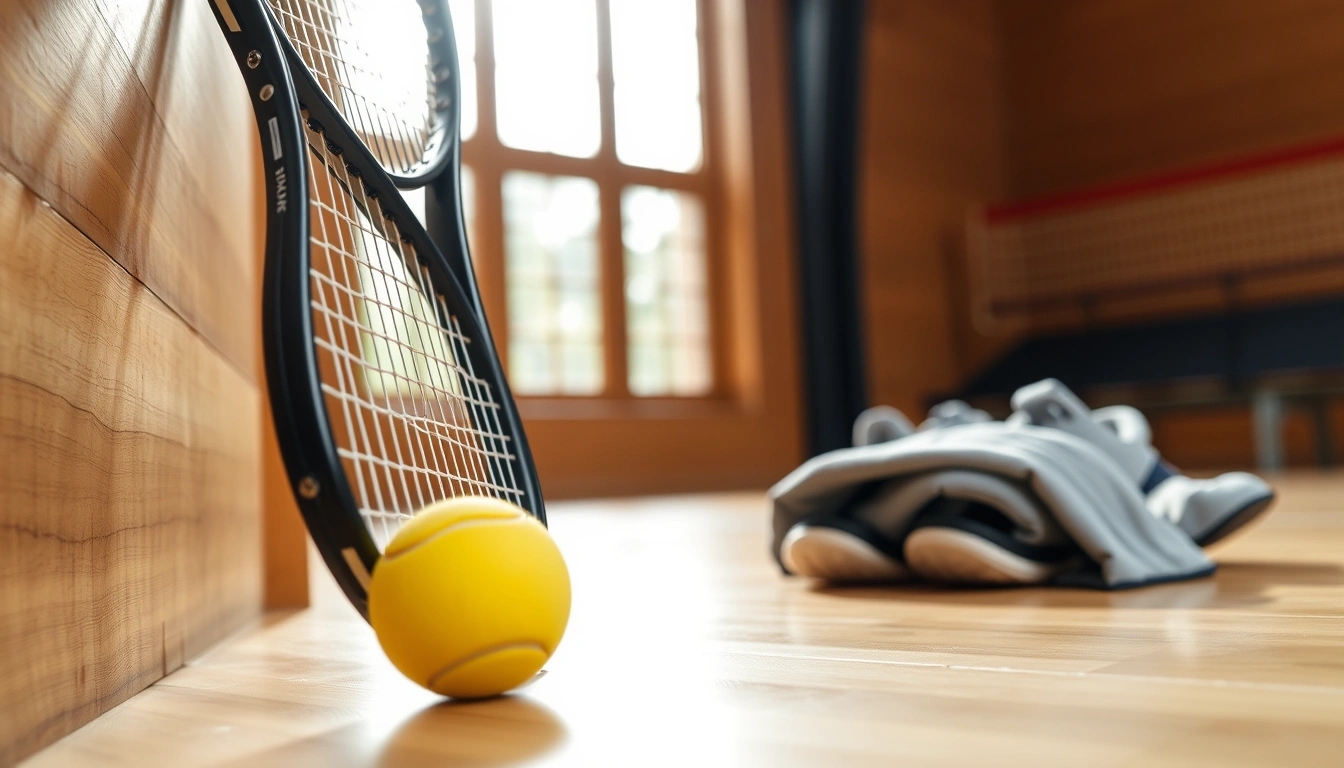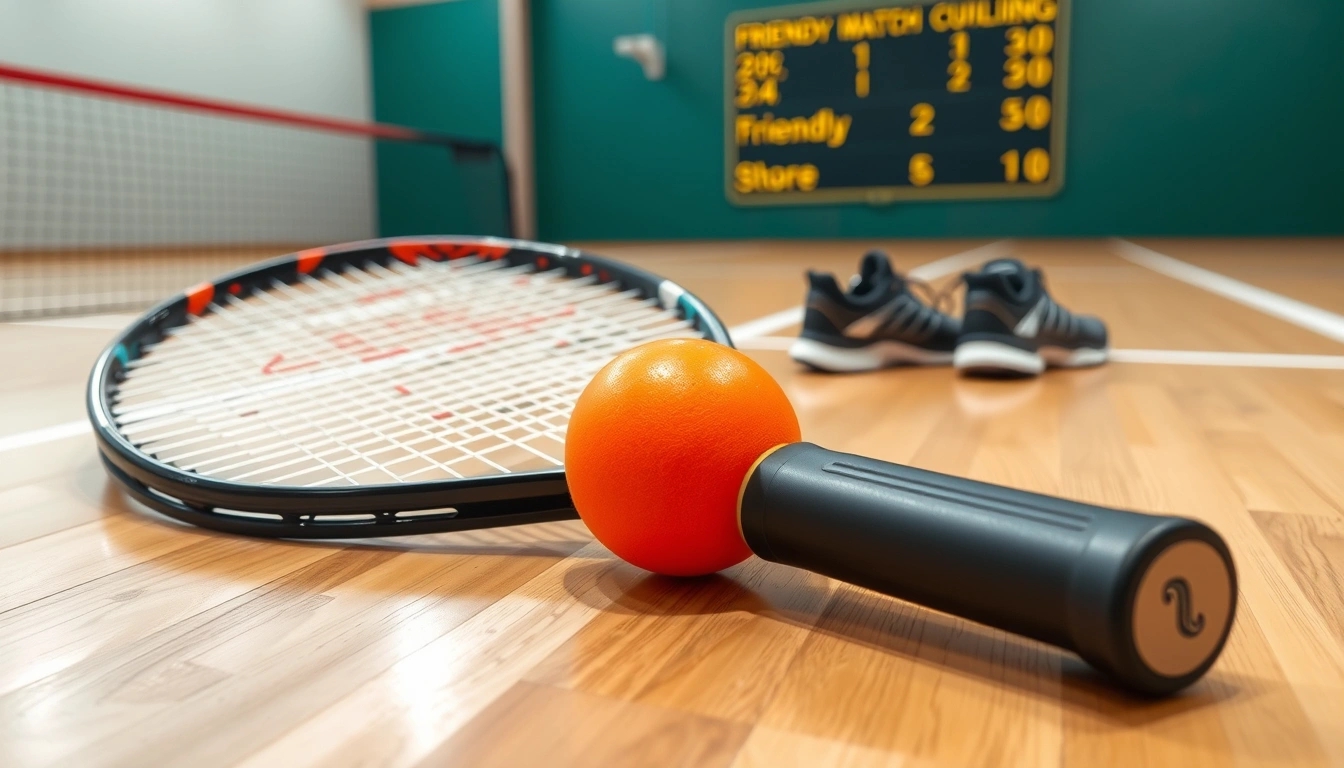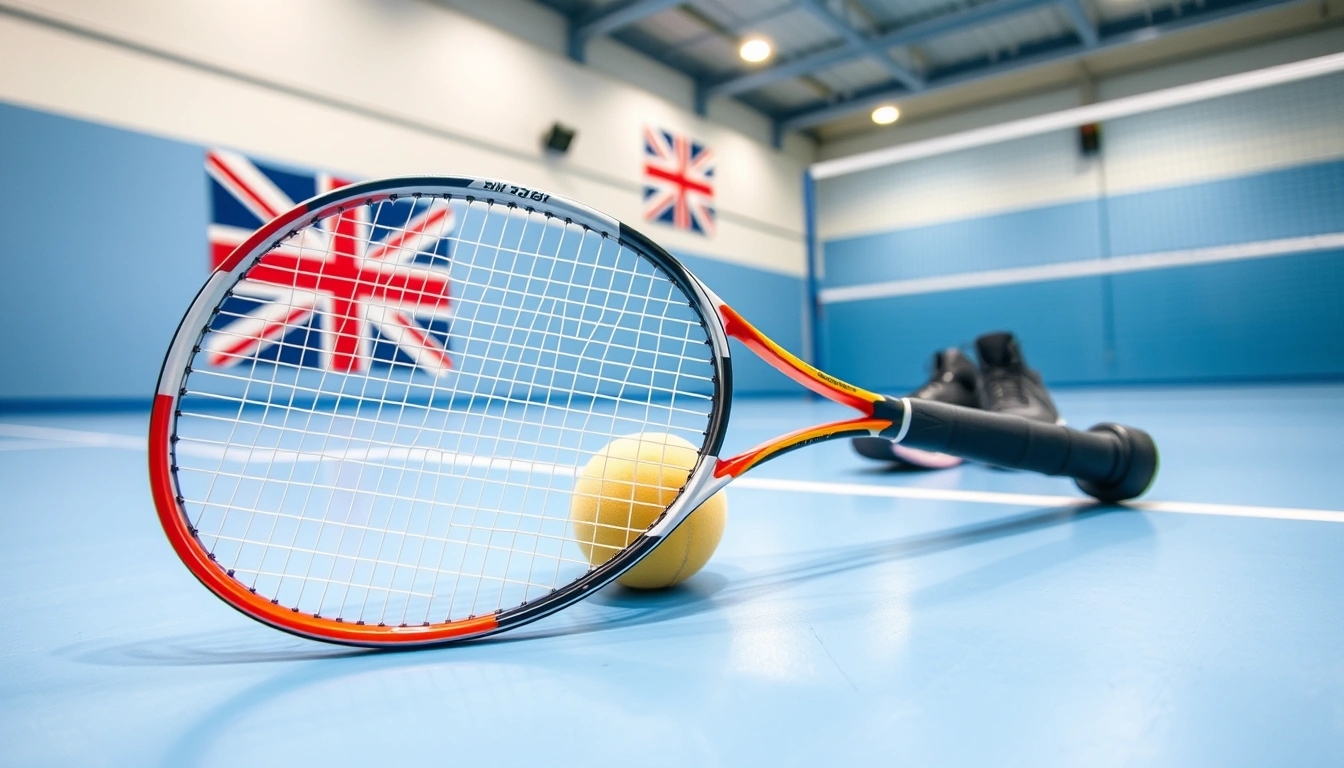Jumping into the world of squash in the UK can feel a bit like diving headfirst into a whirlwind—fast, intense, and a tad bit confusing if you’re a total newbie. But hey, don’t sweat it! Squash is one of those sports that’s easy to pick up but tough to master, which makes it all the more addictive. Whether you’re looking to smash some balls for fun or get seriously competitive, there’s a place for you on the court. So, how do you actually begin? Let’s break it down.
First off, understanding the basics is crucial. Squash is played in a four-walled court with a small rubber ball. The aim? Hit the ball so your opponent can’t return it before it bounces twice. Sounds simple, right? Well, the devil’s in the details—like mastering the serve, controlling your shots, and learning the court’s corners. Beginners often underestimate how much breathing and dodging you’ll do—spoiler: it’s a cardio workout disguised as a game.
- Tip: Watch a few matches online or, better yet, attend a local game to soak up the vibe.
- Tip: Don’t be shy about asking for a quick rundown from a seasoned player—it saves you from embarrassing yourself with basic mistakes.
Next up, finding a court near you is easier than you might think. The UK has tons of options, from community leisure centres to exclusive squash clubs. A quick Google search or using apps like “Squash Finder” can pinpoint courts in your postcode. Remember, some courts require booking in advance, especially during peak hours, so plan accordingly.
| Type of Venue | Typical Cost | Accessibility |
|---|---|---|
| Local Gym | £5-£10 per hour | Generally open to public, easy booking |
| Squash Club | Membership fees apply, often £20-£50/month | More social, better facilities |
| University Courts | Free or discounted for students | Restricted to students or alumni |
Gear-wise, you don’t need to break the bank to get started. A decent racket, suitable squash shoes (trust me, trainers won’t cut it), and some balls are your essentials. Squash balls come in different speeds—start with a ball that’s a bit bouncier to keep rallies going while you get the hang of it. And don’t overlook comfortable sportswear that lets you dart around freely.
- Pro tip: Look out for beginner kits or second-hand gear online; they’re often bargain goldmines.
- Note: Wearing proper squash shoes is non-negotiable to avoid slipping and nasty ankle twists.
Finally, getting involved in a club or group can seriously amp up your squash journey. Clubs offer coaching, social events, and competitive matches that keep things exciting. It’s also a great way to meet fellow enthusiasts who can share tips, motivate you, or just have a laugh when you inevitably miss a shot.
So, if you’re ready to sweat, laugh, and maybe curse a little, squash in the UK is waiting. It’s fast, furious, and oddly satisfying once you get hooked. Just remember: everyone starts somewhere, and even the pros were once beginners fumbling on the court.
Quick checklist to get started:
- Learn basic rules and watch some games
- Find and book a nearby court
- Grab essential gear (racket, shoes, balls)
- Join a club or find a playing partner
- Consider coaching for faster improvement
Now, off you go—time to make those walls echo with the sound of your squash battles!
Understanding Squash Basics
So, you’ve heard the buzz about squash and wondering what all the fuss is about? Well, welcome to the whirlwind world of squash — a game that’s fast, furious, and surprisingly addictive. For those stepping onto the court for the first time, it might seem like a chaotic dance of rackets and balls bouncing off walls, but stick around; it’s simpler than it looks.
First off, squash is played indoors on a four-walled court with a small rubber ball and rackets. The main objective? Keep the ball bouncing and outmaneuver your opponent until they mess up — sounds straightforward, right? But here’s the catch: the ball can only hit the front wall first, and then it can bounce anywhere else. If you miss, or the ball bounces twice before you hit it, you lose the point.
- Basic Rules: Players take turns hitting the ball against the front wall.
- Scoring: Matches usually go up to 11 points per game, and you have to win by two points.
- Serve: The server must hit the ball to the front wall from a service box, and the ball must land in the opposite back quarter of the court.
Now, if you’re scratching your head thinking, “Wait, how do I not get tangled up with my opponent rushing at me?” — well, squash is as much about quick feet and strategy as it is about power. Positioning yourself well and anticipating your opponent’s shots is key. Plus, there’s an unspoken etiquette: don’t get in each other’s way — no one likes a court hog.
| Aspect | Description | Tip for Beginners |
|---|---|---|
| Racket | Lightweight with a small head, designed for quick swings. | Start with a medium-weight racket to get a feel for control vs power. |
| Ball | Small, hollow rubber ball that’s slow to bounce when cold. | Use a double yellow dot ball for advanced play; beginners might want a single dot for easier bounce. |
| Scoring | Point-a-rally system: every rally results in a point. | Keep track of scores verbally; it’s easy to lose count in the heat of the moment. |
Look, don’t expect to master the game overnight — it’s a bit like trying to juggle while running a marathon. But that’s part of the charm. The more you play, the more you’ll notice your reflexes sharpen and your lung capacity improve (breath control is no joke here!). Plus, the thrill of chasing a tricky shot or pulling off a sneaky drop shot? Priceless.
Here’s a quick rundown to keep you grounded when you hit the court:
- Always warm up — your muscles will thank you later.
- Focus on controlling the ball rather than smashing it.
- Watch your opponent’s body language — it’s a goldmine for predicting shots.
- Don’t be afraid to ask for a let (replay) if you’re obstructed.
In short: Squash is a brilliant mix of speed, skill, and smarts. It’s not just about hitting a ball; it’s a mental chess game played at a sprint. So, grab a racket, find a court, and dive in — the fuss is real, and once you get it, you’ll be hooked for life.
Finding Squash Courts Near You
So, you’ve decided to give squash a whirl — brilliant choice! But now comes the real kicker: where on earth do you find a court to play on? Unlike football pitches or basketball courts, squash courts aren’t exactly popping up on every street corner. But don’t sweat it; locating one isn’t rocket science either. Here’s the lowdown on how to track down squash courts across the UK, whether you’re in a bustling city or a sleepy town.
Local Gyms and Leisure Centres
First stop on your squash court hunt should be your local gym or leisure centre. Many of these places have squash courts tucked away inside, often underused and waiting for someone like you to show up. The good news? They’re usually pretty affordable, and you can book a court online or by phone. Some popular chains like David Lloyd, Nuffield Health, or your local council-run centre often have courts available. Just a heads up though — availability can be a bit patchy, especially during peak times, so booking ahead is a smart move.
- Tip: Check if the gym offers trial sessions or beginner packages. It’s a great way to dip your toes in without committing to a full membership.
- Pro Tip: Some gyms might have squash courts but no rackets or balls to hire, so bring your own or check beforehand.
Dedicated Squash Clubs
If you’re really serious about squash (or just want a more social vibe), dedicated squash clubs are the way to go. These clubs often have multiple courts, coaching options, and a community of players ranging from newbies to seasoned pros. The British Squash & Racketball Association website is a treasure trove for finding clubs near you — just pop in your postcode, and voilà!
| Region | Popular Squash Clubs | Features |
|---|---|---|
| London | London Squash Club, Queen’s Club | Multiple courts, coaching, tournaments |
| Manchester | Manchester Squash Club, The National Squash Centre | Elite training, leagues, social events |
| Edinburgh | Edinburgh Squash Club, Craiglockhart Sports Complex | Friendly community, beginner sessions |
Online Court Finders and Apps
In this digital age, there’s an app for everything — including finding squash courts. Websites like SquashLevels or apps like Squash Courts Finder can pinpoint courts near you, show availability, and sometimes even let you book directly. Handy, right? Plus, you might stumble across courts you never knew existed in your area.
Word of Mouth and Social Media
Never underestimate the power of a good old-fashioned chat. Ask around at your gym, workplace, or local community centres. Squash players tend to be friendly folk who love sharing tips. Also, Facebook groups or local sports forums can be goldmines for discovering hidden gems or casual meetups.
Summary Table: Where to Find Squash Courts in the UK
| Place | Pros | Cons |
|---|---|---|
| Local Gyms | Affordable, easy access | Limited availability, fewer courts |
| Squash Clubs | Great community, coaching available | Membership fees, sometimes exclusive |
| Online Apps/Websites | Convenient, up-to-date info | May not cover all courts |
| Social Networks | Insider tips, casual games | Less reliable, depends on contacts |
So, there you have it — a practical, no-nonsense guide to finding your squash sanctuary. Whether you’re booking a casual game or hunting for a club to call home, the UK’s squash scene has plenty to offer. Just remember, the first step is sometimes the hardest, but once you’re on that court, chasing that little black ball around, you’ll wonder why you waited so long. Happy smashing!

Essential Squash Equipment
Jumping into squash can be a bit overwhelming when you stare at all the gear options out there. But don’t sweat it — you don’t need to splash a fortune to get set up and ready to smash that ball around the court. Let’s break down the essentials you’ll want to grab before your first game, and trust me, it’s not rocket science.
Squash Rackets
First up, the racket. It’s your trusty sidekick, so picking one that suits your style and budget is key. You don’t need the latest high-tech carbon fiber monster; a decent beginner racket usually costs around £30-£50. Look for something lightweight (around 130-150 grams) so your arm doesn’t feel like it’s about to fall off after a few rallies. Brands like Head, Dunlop, and Prince have solid beginner options. Pro tip: If you’re just testing the waters, some clubs even lend rackets — saving you cash and commitment.
Squash Balls
Next, the ball. Squash balls come in different speeds, usually marked with coloured dots — blue, red, and double yellow being the most common. For newbies, a red dot ball is perfect since it’s a bit bouncier and easier to play with. Don’t bother buying a dozen right away; start with a couple to get a feel. Balls can be surprisingly cheap, about £5 for a pack of two.
| Equipment | Price Range (£) | Notes |
|---|---|---|
| Squash Racket | 30 – 50 | Lightweight, beginner-friendly rackets |
| Squash Balls (pack of 2) | 5 – 10 | Red dot balls for beginners |
| Squash Shoes | 40 – 70 | Non-marking soles, good grip |
| Apparel | 20 – 50 | Comfortable, breathable clothing |
Squash Shoes
Now, shoes. Please, please don’t just wear your old trainers. Squash courts are slippery, and you want shoes with non-marking soles and excellent grip. This isn’t just about performance; it’s about not sliding into your opponent like a cartoon character. You can find decent squash shoes for £40-£70. They might look like regular sports shoes, but trust me, the difference on court is massive.
Apparel
As for clothing, it’s pretty straightforward: breathable, moisture-wicking fabrics are your friends. No need to buy fancy branded kits, just something that lets you move freely and keeps you cool. Shorts or leggings paired with a simple T-shirt or polo will do just fine. Expect to spend around £20-£50 here if you want to upgrade from your gym clothes.
- Bonus tip: Don’t forget a sweat towel and a water bottle — you’ll thank yourself during those intense matches.
- Budget-friendly hack: Check out second-hand sports shops or online marketplaces for gently used rackets and shoes.
At the end of the day, the best gear is the one that makes you want to get on court and have fun. Don’t get bogged down trying to buy the “perfect” stuff before you even play your first game. Start simple, stay comfortable, and upgrade as you go. Squash is fast, furious, and a bit addictive — so get ready to gear up and dive in without emptying your wallet.
Joining a Squash Club
So, you’ve dabbled with the idea of squash, maybe even swung a racket a few times, and now you’re wondering if joining a squash club is worth the hassle. Well, let me tell you, it’s more than just paying a membership fee and showing up. Joining a club can seriously turbocharge your skills, social life, and overall passion for the game. But hey, it’s not all sunshine and rainbows; picking the right club that fits your vibe and skill level can be a bit like dating—you gotta find the right match.
First off, the skill boost is undeniable. When you’re surrounded by players who are better than you, it pushes you to level up. It’s like being dragged out of your comfort zone kicking and screaming, but in a good way. Clubs often run regular training sessions, drills, and even informal games that help you sharpen your technique without feeling like you’re stuck in a boring classroom. Plus, access to coaches or experienced players who can give you pointers? Priceless. You won’t just be smashing balls blindly anymore; you’ll learn the art behind those killer shots.
| Benefit | Why It Matters |
|---|---|
| Skill Improvement | Regular practice with diverse players and coaching support |
| Social Connections | Meet people who share your interests, making squash more fun |
| Motivation | Friendly competition and scheduled sessions keep you coming back |
| Access to Facilities | Better courts and equipment than random public gyms |
Now, onto the social perks. Squash clubs are little communities. You’re not just there to chase a ball; you’re there to meet people who get why you’re obsessed with this sweaty, fast-paced sport. Whether it’s post-game banter over a pint or joining club tournaments, it’s a great way to make friends or even find a squash buddy who’ll drag you to early morning sessions when you’d rather hit snooze. And trust me, that kind of accountability is gold.
- Tip 1: Visit a few clubs before committing. Some have open days or trial sessions.
- Tip 2: Check the club’s vibe—are members mostly hardcore competitors, casual players, or a mix?
- Tip 3: Look at the facilities and court availability. Nothing worse than a packed court schedule.
- Tip 4: Ask about coaching options and social events—they make a big difference.
Picking the right club isn’t just about location or price. It’s about how comfortable you feel walking through the door. Some clubs are super competitive, with players who eat, sleep, and breathe squash (and maybe intimidate the newbies a bit). Others are more laid-back, focusing on fun and social play. If you’re just starting out, the latter might save you some embarrassment and keep your enthusiasm alive. But if you’re itching to improve fast and don’t mind a bit of pressure, the competitive club scene could be your playground.
Lastly, don’t underestimate the enthusiasm factor. Being part of a club means you’re constantly surrounded by people who love squash as much as you do. That contagious energy can turn a casual interest into a full-blown obsession (in a good way). And when you see your progress, make new friends, and maybe even win a club tournament or two, you’ll wonder why you didn’t join sooner.
So, to sum up: joining a squash club is like adding rocket fuel to your squash journey. It’s about growth, community, and a whole lot of fun. Just remember to pick a club that fits your style and don’t be afraid to shop around. After all, it’s your game, your pace, and your vibe.
Squash Coaching and Training Options
So, you’ve decided to take your squash game up a notch, huh? Brilliant choice! Whether you’re a total newbie fumbling with the racket or someone who’s been smashing walls for a while but still can’t quite nail that perfect serve, the right coaching can make all the difference. The UK’s squash scene is buzzing with a variety of coaching options, and trust me, there’s something for every type of player, budget, and schedule.
First off, private lessons are like the VIP treatment of squash training. You get one-on-one time with a coach who’ll tailor everything to your strengths, weaknesses, and quirky playing style. It’s intense, focused, and efficient — but fair warning, it can also be a bit pricey. However, if you’re serious about improving fast, this is probably your best bet. Coaches will dive into your footwork, shot selection, and even the mental game, which is often overlooked but oh-so-important.
Not everyone can afford private coaching all the time, and that’s where group sessions come in handy. These are usually more affordable, plus you get the added bonus of some friendly competition and camaraderie. Group training is perfect for working on general skills, drills, and fitness. You’ll often find these sessions at local squash clubs or community centres. Just a heads-up though — group sessions can sometimes feel a bit chaotic if the coach’s attention is split among too many players.
| Coaching Type | Pros | Cons | Ideal For |
|---|---|---|---|
| Private Lessons | Personalized focus, fast progress, flexible scheduling | Expensive, can be intense | Serious players, beginners wanting quick improvement |
| Group Sessions | Affordable, social, good for general skills | Less individual attention, can be crowded | Casual players, budget-conscious learners |
| Workshops & Clinics | Focused topics, short-term commitment, fun | Limited depth, scheduled times | Players wanting to target specific skills |
| Online Coaching | Flexible, accessible anywhere, often cheaper | Lack of physical presence, depends on self-discipline | Busy individuals, remote learners |
Another option that’s gaining traction is workshops and clinics. These are usually short, punchy sessions focusing on a particular skill — like perfecting your backhand or mastering your serve. They’re great if you want to sharpen up one aspect without committing to a full course. Plus, they often have a fun, less formal vibe, so you won’t feel like you’re back in school.
Now, don’t overlook the rise of online coaching. Yes, it might sound odd to learn squash without a coach physically there to shout “Move your feet!” but with video analysis, live feedback through apps, and detailed tutorials, it’s surprisingly effective. Plus, if you’re juggling work, family, or just hate sticking to a rigid schedule, online coaching offers flexibility that traditional lessons can’t match. Just be prepared to be your own motivator — because no coach is going to drag you out of bed for a 7 am session online!
- Tip 1: Always check the coach’s credentials and reviews. Not all squash coaches are created equal.
- Tip 2: Don’t be shy to try a trial session before committing — see if their style clicks with you.
- Tip 3: Mix and match coaching types. Maybe a private lesson once a month, group sessions weekly, and some online drills on the side.
At the end of the day, squash coaching is about finding what works for you — your goals, your budget, your personality. No shame in starting slow or switching things up if you’re not feeling it. Remember, the court is your playground, and the journey to squash greatness should be as fun as it is challenging. So, get out there, swing that racket, and maybe, just maybe, you’ll be the next big thing on the UK squash scene.

Squash Etiquette and Sportsmanship
Alright, so you’ve finally decided to step onto the squash court — good on you! But before you start smashing balls like you’re the next world champ, let’s talk about something that’s often overlooked but absolutely crucial: etiquette and sportsmanship. Believe me, nothing kills the vibe faster than someone who doesn’t get the unwritten rules of the game. And trust me, you don’t want to be that person who embarrasses themselves (or worse, their playing partner).
First off, squash is a fast-paced and intense sport, but it’s also a gentleman’s (or lady’s) game. The court is small, the action is close, and tempers can flare if you’re not careful. So, here’s a quick rundown of the dos and don’ts to keep things smooth and friendly.
| Do | Don’t |
|---|---|
| Call your own lets and strokes honestly — no one likes a cheat. | Argue aggressively over every close call. It’s just a game, not a courtroom. |
| Apologize if you get in your opponent’s way or block their shot. | Ignore your partner or act like you own the court. |
| Keep your racket under control — no wild swings near people. | Trash talk excessively or show poor sportsmanship after losing. |
| Wait for your turn to serve and be ready when it’s your shot. | Take forever between points — the game’s meant to be quick. |
Now, if you think etiquette is just about following rules, think again. It’s really about respect: respect for your opponent, the game, and the shared space. Squash courts can get cramped and heated, literally and figuratively, so keeping your cool is half the battle.
One thing that trips up newbies is the whole “let” system. If you accidentally block your opponent’s shot or get in their way, you’re supposed to call a “let” — basically a do-over. It’s not a free pass to be clumsy, though. If you’re unsure, just ask politely or give the benefit of the doubt. The worst thing? Staying silent and letting frustration build. That’s a recipe for awkward silences and bad vibes.
- Shake hands at the end of the match — win or lose. It’s basic respect, people.
- Don’t hog the court if others are waiting — squash is popular, especially in the UK!
- Keep noise to a minimum — shouting “YES!” after a great shot is cool, but constant yelling? Not so much.
And hey, remember that everyone was a beginner once. If you’re playing with someone less experienced, be patient. Offer tips if asked, but don’t be a know-it-all. The goal is to have fun and improve, not to intimidate.
Last but not least, sportsmanship isn’t just about what you do on court. It’s about how you carry yourself off it too. Congratulate your opponent, don’t gloat, and keep the spirit of the game alive. Squash is a fantastic sport that brings people together — so don’t be the one who spoils it.
Quick Etiquette Checklist:- Arrive on time and be ready to play.- Call lets and strokes fairly.- Apologize if you obstruct.- Keep racket under control.- Be courteous and patient.- Shake hands post-match.- Respect court time and others waiting.
So, to wrap it up: play hard, but play fair. Keep your manners sharp, your attitude humble, and your game fun. That way, you’ll not only avoid embarrassment but also gain respect — and maybe even a few squash buddies along the way. Now, go on, hit that court like you mean it!
Health Benefits of Playing Squash
Squash isn’t just a game for the nimble or the super fit; it’s actually a powerhouse when it comes to boosting both your body and mind. If you’ve ever wondered why so many folks swear by this fast-paced sport, let’s unpack the real deal behind its health perks — and trust me, it’s more than just running around chasing a tiny ball.
First off, squash is a cardio beast. Imagine darting across the court, lunging, twisting, and sprinting all in quick bursts — your heart rate doesn’t just rise, it practically throws a party. This high-intensity interval activity torches calories like nobody’s business, making it a brilliant choice if you want to shed some pounds or just keep your ticker happy. Plus, because it’s so dynamic, it improves your agility and coordination, which can be handy in everyday life — you know, dodging that random cyclist or catching the bus on time.
| Physical Benefits | Details |
|---|---|
| Cardiovascular Health | Boosts heart rate and endurance through intense bursts of activity |
| Muscle Strength | Engages legs, arms, and core for a full-body workout |
| Flexibility & Agility | Quick movements enhance joint mobility and reflexes |
| Weight Management | High calorie burn aids in fat loss and maintaining healthy weight |
But wait, it’s not all sweat and panting. Squash has some serious mental perks as well. The game demands sharp focus and strategic thinking — you’ve got to anticipate your opponent’s next move, decide whether to lob or drive, and keep your cool when you’re gasping for air. This mental workout can sharpen your concentration and quick decision-making skills. And hey, who doesn’t want a brain boost while breaking a sweat?
- Stress Relief: The intense physical activity triggers the release of endorphins, those feel-good hormones that can lift your mood and chase away stress.
- Improved Mental Resilience: Handling the fast pace and pressure on court helps build grit and patience.
- Social Connection: Playing with others creates a sense of community, which is great for your emotional wellbeing.
Now, I won’t pretend squash is a walk in the park. It’s demanding and can be downright exhausting, especially when you’re just starting out. But here’s the kicker — that very challenge is what makes it so rewarding. You get fitter, faster, and mentally tougher, all while having a blast.
Tips for Getting the Most Out of Squash’s Health Benefits:- Warm up properly to avoid injuries (dynamic stretches work wonders)- Mix up your sessions: combine solo drills with matches for variety- Stay hydrated — you’ll sweat buckets!- Listen to your body; rest when needed to recover fully
So, whether you’re chasing fitness goals or just looking for a fun way to blow off steam, squash offers a win-win combo of physical and mental rewards. It’s not just a game; it’s a lifestyle upgrade wrapped in a sweaty, exhilarating package. Ready to grab that racket yet?
Popular Squash Tournaments in the UK
If you’re even a tad bit curious about the squash scene in the UK, then you’ve probably heard whispers about some of the big-name tournaments that make the sport buzz with excitement. Whether you’re a couch potato who loves to watch the pros sling the ball around or a budding player dreaming of someday stepping onto that court yourself, the UK’s squash calendar has something that’ll get your heart racing. Let’s dive into the nitty-gritty of these events, shall we?
First up, the British Open Squash Championships. Often dubbed the “Wimbledon of Squash,” this tournament is the crème de la crème of the squash world. It’s been running since the 1920s and attracts the biggest names from across the globe. The atmosphere? Electric. The skill level? Jaw-dropping. If you ever get a chance to watch it live, grab it — the energy in the arena is something you don’t forget easily.
| Tournament | Location | When | Who Can Participate |
|---|---|---|---|
| British Open Squash Championships | Manchester (usually) | May | Professional Players |
| British National Squash Championships | Various venues | December | UK-based Players |
| UK Squash Grand Prix | Rotating venues | Throughout the Year | Open to Professionals and Amateurs |
Now, not everyone can just stroll into the British Open, so what about the British National Squash Championships? This one’s a bit more down-to-earth but no less competitive. It’s the perfect arena for UK players to showcase their talents and climb the ranks. It’s held annually, usually in December, and is a hot ticket for local fans who want to see the stars of tomorrow.
For those who like a bit more variety, the UK Squash Grand Prix series offers multiple tournaments across the country. This one’s a bit of a mixed bag – pros and amateurs alike get a chance to test their mettle, and the venues rotate, keeping things fresh and exciting. It’s also a great way to dip your toes into competitive squash without the pressure cooker vibe of the big leagues.
- Watching these events: Most major tournaments offer live streaming nowadays, so even if you can’t make it to the venue, you’re not missing out.
- Competing: Start small with local club competitions, then work your way up to county and national levels.
- Volunteering: If playing isn’t your thing yet, volunteering at tournaments is a great way to get involved and soak up the atmosphere.
And hey, don’t get discouraged if you’re just starting out. The squash community in the UK is surprisingly welcoming. Many tournaments have accompanying amateur and junior events, so there’s a spot for everyone. Plus, the adrenaline rush of competing, even at a local level, is something else — it’s addictive in the best way.
In short, whether you’re dreaming of smashing a winner at the British Open or just want to watch some fast-paced squash action from the sidelines, the UK’s squash tournaments offer a vibrant, thrilling experience. Keep an eye on local squash club noticeboards and websites like England Squash for the latest updates and entry details. And remember, every pro was once a beginner fumbling with their racket – so why not start your journey now?

Squash for Kids and Families
isn’t just a fancy tagline to lure you into dusty gym halls — it’s genuinely one of the most family-friendly sports out there. If you think squash is just for sweaty singles matches between gym rats, think again. Across the UK, squash courts are buzzing with junior programs and family sessions that welcome everyone from tiny tots to grandparents who just wanna have fun (and maybe show off their sneaky backhand).
First off, let’s talk about the junior programs. These are specially designed to get kids hooked early, but without the pressure of turning them into the next world champion overnight. Coaches focus on fun drills, basic skills, and teamwork — because, honestly, no one wants a grumpy kid sulking over lost points. Many clubs offer age-specific classes, so whether your kid is 5 or 15, there’s a spot for them. Plus, it’s a great way for them to burn off some energy without being glued to screens.
| Age Group | Focus | Duration | Frequency |
|---|---|---|---|
| 5-8 years | Basic racket skills, fun games | 30-45 minutes | Once or twice a week |
| 9-12 years | Technique, mini matches | 45-60 minutes | 2-3 times a week |
| 13-15 years | Competitive play, fitness | 60 minutes | 3+ times a week |
Now, what about the adults? Don’t worry, family squash isn’t just about watching the kids play while you sip tea. Many clubs offer family-friendly court times, where parents and kids can hit the court together. It’s a brilliant way to bond, and trust me, nothing beats the sight of your dad trying to keep up with a 10-year-old zooming around the court. Plus, it’s a sneaky way to get some exercise without the usual “let’s go for a run” complaints.
- Family court sessions: Scheduled times where courts are reserved for family play.
- Mixed doubles matches: Great for mixed-age teams and some friendly competition.
- Parent-child coaching: Sessions designed to teach both generations together.
Of course, getting the whole family involved isn’t always smooth sailing. Younger kids might lose interest quickly, or adults might feel intimidated if they’re new to the game. But here’s the kicker — squash’s fast-paced nature means everyone can find their rhythm. And with the right attitude, a few laughs, and maybe a bit of healthy teasing, it can become a weekly highlight.
In terms of gear, don’t panic. You don’t need top-of-the-line rackets or expensive shoes for beginners—especially for kids who might outgrow everything in six months. Most clubs offer rental equipment, and some even have loaner rackets for family sessions. So, no excuses!
Tips for Making Squash a Family Hit:- Start slow: Begin with short, fun sessions.- Encourage all skill levels: It’s about fun, not perfection.- Celebrate small wins: Every rally counts!- Mix it up: Try doubles or mini-games to keep things fresh.- Use local clubs: They often have family discounts or packages.
In a nutshell, squash for kids and families is a smashing idea (pun intended). It’s accessible, engaging, and a brilliant way to keep everyone active without the usual “I’m bored” cries echoing through the house. So, grab a racket, find your nearest club, and get ready for some family fun that’s anything but dull.
Cost Breakdown: Playing Squash on a Budget
So, you’re thinking about diving into the fast-paced, sweat-dripping world of squash but worried about the costs? Fair enough — starting any sport can feel like a wallet-drainer, but squash doesn’t have to be a financial black hole. Let’s rip off the band-aid and take an honest, no-fluff look at what you’re really signing up for, and how to keep your bank balance happy without skimping on the fun.
First up: court fees. This is usually where most beginners choke. Renting a squash court in the UK can vary wildly — anywhere from £6 to £15 per hour depending on location and time. City centres? Expect to pay top dollar. Small towns or community centres? You might snag a bargain. Pro tip: look for off-peak hours or multi-session packages. Many clubs offer discounted rates if you book in bulk or play during quieter times.
| Expense | Typical Cost | Money-Saving Tip |
|---|---|---|
| Court Hire | £6 – £15 per hour | Book off-peak or buy bulk passes |
| Squash Racket | £30 – £150+ | Buy second-hand or beginner models |
| Squash Balls | £5 – £15 per pack | Choose slower balls for beginners, buy multi-packs |
| Shoes | £40 – £100+ | Look for sales or use general indoor trainers |
| Club Membership | £20 – £60 monthly | Try pay-as-you-go or casual memberships |
Next, the gear. Honestly, you don’t need to splash out on the latest carbon-fibre racket to enjoy your first few sessions. Beginner rackets can be had for around £30 to £50, especially if you’re happy to scout online marketplaces or visit local sports shops during sales. Just don’t get suckered into the “pro” racket hype too soon — it’s like buying a Ferrari before you can drive stick.
Balls? They’re cheap but can be a little confusing. Squash balls come in different speeds and bounciness. Beginners usually start with a ball that’s a bit slower (like a double yellow dot) because it gives you more time to react — and they’re often sold in multi-packs, so buying in bulk saves pennies.
Shoes are a tricky one. You want proper squash or indoor court shoes to avoid slipping and injuries, but these can hit £40 to £100. If you’re strapped for cash, decent indoor trainers with non-marking soles can be a temporary fix. Just don’t make a habit of it — your ankles will hate you.
Joining a club can be a double-edged sword. Memberships range from affordable community clubs to posh private ones that charge a small fortune. If you’re not ready to commit, many clubs offer pay-as-you-play options. This way, you get access to courts and a community without the monthly bill looming over your head.
- Tip 1: Always ask if there’s a trial period or beginner discount.
- Tip 2: Buddy up! Some clubs offer group discounts or refer-a-friend deals.
- Tip 3: Check out local council-run sports centres — they often have cheaper courts and equipment hire.
Look, squash is fast, fun, and fantastic for fitness — but starting out doesn’t mean you need to empty your pockets. With a bit of savvy shopping, flexible scheduling, and some patience, you can get on court without feeling like you’re robbing a bank.
So grab a racket (new or used), find a court, and get ready to smash those worries — and maybe a few balls too.
Common Challenges Beginners Face
Common Challenges Beginners Face in Squash
Jumping into squash as a newbie can feel like stepping into a whirlwind—fast, intense, and a bit intimidating. Don’t worry, you’re not alone. Most beginners hit some classic roadblocks that can make you question if you should just stick to jogging or, heck, binge-watch another series instead. But hang tight, because these hurdles are totally normal, and with a bit of grit and savvy, you can smash through them without losing your love for the game.
Stamina Woes
Squash is a relentless cardio beast. If you’re used to chilling on the couch or just casual walks, the first few sessions might leave you gasping like a fish out of water. It’s not just about running; it’s sprinting, lunging, twisting, and recovering—all in rapid-fire succession.
- Tip: Build your stamina gradually. Start with shorter games or practice drills, then slowly ramp up the intensity. Don’t be that person who burns out after one match and vows never to return.
- Bonus hack: Incorporate some cross-training like cycling or swimming to boost your endurance without overloading those squash muscles.
Technique Troubles
Let’s be honest, swinging a racket like a pro doesn’t come overnight. Your shots might feel clumsy, and you’ll probably whiff more balls than you hit. It’s frustrating, but hey, that’s part of the charm.
| Common Technical Issues | How to Fix Them |
|---|---|
| Poor grip and racket control | Watch tutorials, ask a coach, or buddy up with experienced players to learn the right grip and wrist movement. |
| Bad footwork and positioning | Practice foot drills and always try to stay on the balls of your feet—this helps you react faster. |
| Inconsistent shot accuracy | Focus on hitting the ball cleanly and aim for controlled, not powerful, shots initially. |
Court Anxiety and Social Jitters
Walking into a squash court for the first time can feel like entering a gladiator arena. What if you mess up? What if everyone’s watching? It’s a real thing, and it can freeze you up.
- Pro tip: Remember, most players were beginners once. Everyone appreciates effort and enthusiasm more than perfection.
- Try to play with supportive friends or join beginner-friendly clubs where the vibe is chill and welcoming.
- Breathing exercises before matches can calm nerves—sounds cheesy, but it works.
Keeping the Fire Alive
The initial excitement can fizzle out once you hit these challenges. It’s easy to feel discouraged, but the key is to celebrate small wins—like finally nailing a serve or lasting an entire game without collapsing.
Set mini goals:- Play twice a week- Master a backhand shot- Join a local tournament (even if just to watch)
Tracking your progress with an app or journal can make a huge difference. Plus, sharing your journey with fellow squash lovers brings accountability and fun.
In the end, stumbling through stamina issues, technique blunders, and court jitters is just part of the squash initiation ritual. Keep your chin up, embrace the awkwardness, and soon you’ll be darting around the court like it’s second nature. Remember, even the pros had to start somewhere—and probably looked just as lost as you do now.
So, lace up those shoes, grip that racket, and get ready to face these challenges head-on. Squash isn’t just a sport; it’s a wild ride worth every sweaty, breathless moment.

Staying Motivated and Tracking Progress
Alright, so you’ve picked up the squash racket, found a court, and maybe even survived your first few games without tripping over your own feet. But here’s the real kicker — how do you keep that fiery passion alive? Squash can be a bit like that one friend who’s super fun but sometimes a pain in the neck. You want to keep playing, but the grind can get real, real fast. So, let’s talk about some down-to-earth strategies to keep your squash journey exciting, rewarding, and dare I say, downright addictive.
Set Realistic and Personal Goals — Sounds like coach-speak, right? But trust me, having clear goals is like having a map when you’re lost in the woods. Don’t aim to become the next world champ overnight. Instead, break it down. Maybe your first goal is to improve your serve or just to last a full match without gasping for air like a fish out of water. Write these goals down, revisit them, and tweak them as you go. It makes every practice session feel like a step forward, not just a sweaty slog.
| Example Goals | Why It Works |
|---|---|
| Play twice a week | Builds consistency and habit |
| Master the backhand shot | Improves technical skill |
| Join a local tournament | Boosts motivation and social interaction |
| Track match stats | Provides measurable progress |
Now, let’s get techy — using apps isn’t just for social media stalking or doomscrolling. There are plenty of squash-specific apps out there that help you track your games, analyze your shots, and even connect with other players. Apps like “Squash Levels” or “Squash Skills” can give you insights on your strengths and weaknesses. Plus, it’s kind of fun to see your progress plotted out in charts and graphs — who knew stats could feel so satisfying?
- Match tracking: Record wins, losses, and key stats.
- Skill drills: Guided exercises to improve technique.
- Community features: Find local players or clubs.
- Reminders: Keep your practice schedule consistent.
But hey, don’t forget to celebrate the small wins. Did you finally nail that tricky volley? Did you manage to run down a ball without collapsing? These moments deserve a fist bump or maybe a cheeky treat. It’s easy to get caught up chasing big milestones and forget that the tiny victories are what keep the fire burning. Some players even keep a squash journal — jotting down what went well after each session can be surprisingly motivating.
Tips for Celebrating Small Wins:- Share your progress with friends or club mates- Treat yourself to a new grip or gear upgrade- Take a moment to reflect on improvements- Set mini-rewards for achieving weekly goals
Lastly, mix it up. If you start feeling like squash is turning into a chore, switch things around. Try playing doubles, join a fun social league, or even watch some pro matches online to reignite that spark. Remember, the journey is supposed to be fun — if it’s not, it’s time to shake things up.
So, to sum it all up: set goals that matter to you, use technology to stay on track, and never underestimate the power of a good celebration. Keep things fresh, keep pushing, and most importantly, keep enjoying the game. Squash isn’t just a sport — it’s a rollercoaster of sweat, laughs, frustration, and triumph. Buckle up and enjoy the ride!
Frequently Asked Questions
- What is the best way to find squash courts near me?
Finding squash courts in the UK is easier than you might think! Start by checking local gyms, community centres, and dedicated squash clubs online. Websites and apps like Playfinder or local council pages often list available courts and booking options. Don’t forget to ask around—sometimes the best courts are hidden gems known only to locals!
- Do I need special equipment to start playing squash?
Absolutely! While you can borrow gear initially, investing in your own racket, non-marking shoes, and comfortable sportswear will make a huge difference. Squash balls come in different speeds, so beginners usually start with a ball that’s a bit bouncier to keep rallies going. Think of your equipment as your trusty sidekick on this fast-paced adventure.
- How can joining a squash club improve my game?
Joining a club is like plugging into a vibrant community of players who share your passion. You’ll get access to regular playtimes, coaching, and social events, which all help sharpen your skills and boost motivation. Plus, it’s a fantastic way to make friends who’ll cheer you on as you smash those shots!
- Is squash suitable for kids and families?
Definitely! Squash is a family-friendly sport that encourages fitness and fun across all ages. Many clubs offer junior programs and family sessions, making it a perfect way to bond while staying active. It’s like a mini adventure everyone can join, from tiny tots to grandparents!
- What are some common challenges beginners face in squash?
Starting squash can feel like learning a new language—there’s stamina, technique, and even a bit of court anxiety to tackle. Don’t sweat it! Most newbies struggle with these at first, but with practice and maybe a coach or friendly club mates, you’ll find your rhythm and confidence growing steadily.
- How much does it cost to start playing squash on a budget?
Squash can be surprisingly affordable if you play smart. Court fees vary, but many community centres offer off-peak discounts. Basic gear doesn’t have to break the bank—look for beginner rackets and shoes on sale or second-hand. Remember, it’s your passion and hustle that count more than fancy equipment!
- What health benefits can I expect from playing squash regularly?
Squash is a powerhouse for your body and mind. It boosts your cardiovascular fitness, tones muscles, and improves agility. Mentally, it’s a fantastic stress-buster and sharpens focus. Think of it as a fun workout disguised as a thrilling game—you’ll feel energized and happier after every session.
- Are there coaching options available for beginners?
Yes! Whether you prefer one-on-one lessons or group sessions, coaching is widely available across the UK. Many clubs offer beginner-friendly classes to get you started with the right techniques and rules. A good coach can turn confusion into confidence and make every swing count.
- What’s the etiquette I should know before playing squash?
Squash etiquette is all about respect—giving your opponent space, calling your own faults, and keeping the game friendly. Think of it like a dance where both players move in harmony. Following these unwritten rules keeps the game fair and fun for everyone involved.
- Can I watch major squash tournaments in the UK?
Absolutely! The UK hosts some exciting squash events throughout the year, like the British Open. Attending these tournaments is a fantastic way to see top players in action and get inspired. Who knows? Watching pros might just ignite your own squash fire!













